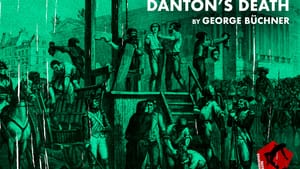Stay in the Loop
BSR publishes on a weekly schedule, with an email newsletter every Wednesday and Thursday morning. There’s no paywall, and subscribing is always free.
Political violence…in this economy?
Quintessence Theatre presents Georg Büchner’s ‘Danton’s Death’

For many, the week of the 2020 general election felt like a good time to stick their heads in the sand. As COVID cases continued to rise and a critical period of our nation’s future loomed, I certainly understand anyone who had the urge to find a bottle (or five) of wine, deactivate your Twitter account, and see how many seasons of Real Housewives you could (re)watch. On the other hand, some of us couldn’t turn away from the news; we wanted to keep abreast of every new poll, update, and prediction. For folks in the middle, Quintessence Theatre’s livestream reading of Danton’s Death provided a brief break from our current reality by plugging us into the political dramas of 18th century France.
Thirty-nine years later
Set amid the bloodiest years of the French Revolution, Georg Büchner’s first play explores the inner mechanisms of the revolutionary Terror. Written just 39 years after the events it depicts, Danton’s Death marries expressive prose with documentary research to showcase how quickly political violence can turn on those who seek control. This is not light stuff, and the heady, text-heavy script did not benefit from the static reality of a virtual reading. The limitations of the computer screen made some of the larger crowd scenes noticeably awkward (historically, lavish productions call for hundreds of “citizens” to flood the stage.) As Quintessence’s Danton became imprisoned and questioned by the tribunal, the confinement of the COVID-era medium became more appropriate, and therefore, more effective.
For fans of political theater
Danton’s Death marked the fourth and final installment of Quintessence’s Shout into the Void Virtual Play Reading Festival, and director Max Shulman led a talented and far-flung cast. Starring as the revolutionary-turned-moderate, Jordan Barbour gave us a contemporary, rakish portrayal of Georges Danton. Büchner never lets a moment dwindle into sentimentality, offering witty retorts among all the speechifying, philosophizing, and tragedy. Barbour succeeded on all fronts and offered a humane and utterly likable protagonist. Local favorite J. Hernandez performed several roles with a broad sensibility that livened up the affair. Other standouts included Jessica Ko as Danton’s lover, Marion, and Christina Norris as Danton’s wife, Jessica.
While watching this reading, I felt lucky that I had recently refreshed my knowledge of the history of the French Revolution (thanks to Mike Duncan’s fabulous podcast Revolutions). Without a primer on the French Revolution, the events of the play are confusing. Characters, events, and places go by so quickly that a full production would likely benefit from some extremely focused dramaturgy. I hope that Quintessence gets to mount such a production someday. In the meantime, for those with a keen interest in revolutionary France or political theater more broadly, this was an excellent chance to hear Büchner’s text read aloud by a talented cast.
Image description: The poster for Quintessence Theatre’s Danton’s Death by Georg Büchner. A historic black-and-white illustration appears in a green wash, showing a crowd at the foot of a guillotine’s dais. One man is being forced to the open guillotine and another man holds two severed heads out to the crowd. The play’s title and writer appears in white text at the top right corner.
What, When, Where
Danton’s Death. By Georg Büchner, directed by Max Shulman. Streaming online by Quintessence Theatre through November 6, 2020. (215) 987-4450 or Quintessencetheatre.org/danton.
Sign up for our newsletter
All of the week's new articles, all in one place. Sign up for the free weekly BSR newsletters, and don't miss a conversation.

 Josh Herren
Josh Herren